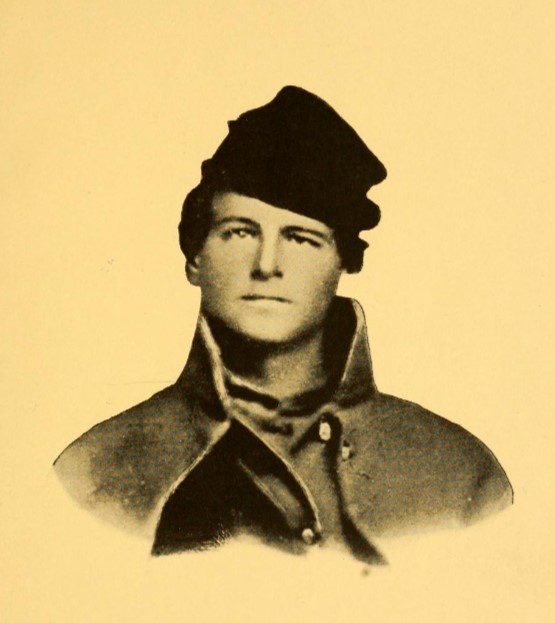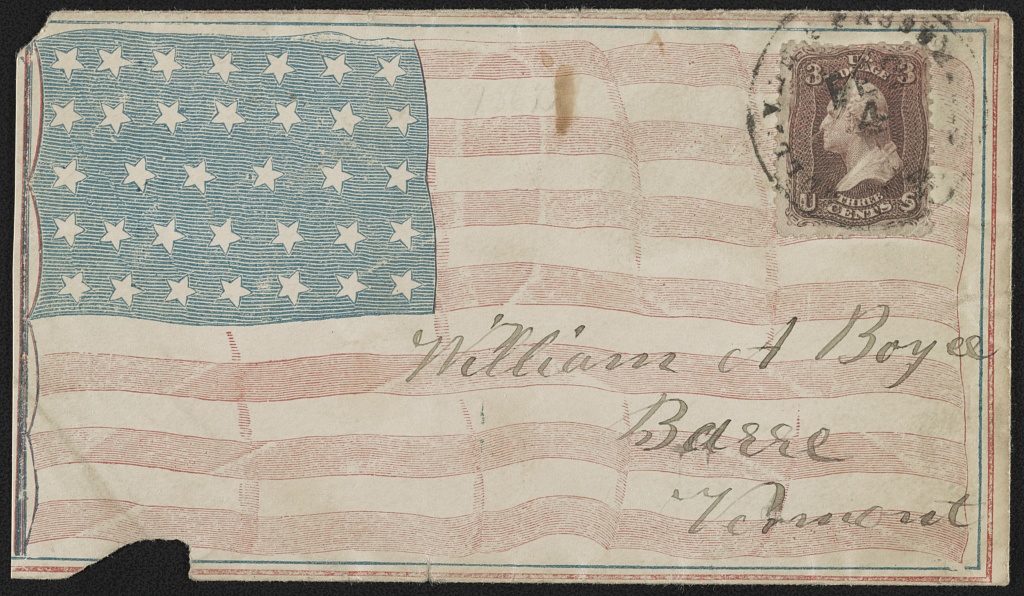July 4, 1863: “This Most Eventful Day to the American People”
Happy Independence Day!
Seth J. Wells served in the 17th Illinois Infantry Regiment at the time of the Siege of Vicksburg. His unit was part of the Third Brigade, Third Division of General James B. McPherson’s XVII Corps. Wells left a diary that was published in part in 1915, highlight his experiences near Vicksburg, Mississippi, and including these entries from July 3 and July 4, 1863.
160 years ago, soldiers on both sides realized that a Confederate surrender was imminent and then witnessed a Fourth of July with joyous and tragic scenes unlike any other Independence Day.

July 3. Friday. There was a brisk skirmish on our left last night. The Rebs came out of their works and attempted to drive in our picket, but were driven back with a loss of nearly one hundred men whom they left on the field. At 10 o’clock a flag of truce came out and the bearer was escorted to Gen. Grant’s headquarters. As to the object, every one has his own opinion. I hope to Heaven it is to propose terms of surrender. Most of the boys think it is to bury the killed of last night.
Neut. Davis and I took advantage of the cessation of hostilities and crossed the hill to the old fort. We slipped the guard and reached the far end of the works within a few yards of those of the Rebels, who lined their parapets as far as the eye could see. We stood face to face with them, almost near enough to shake hands, yet not a word was spoken on either side until their officers ordered us down as we were inspecting their works too closely. Gen. Leggitt ordered us to go outside the guard and their officers drew off their men. Hostilities were suspended until 2 :30, when a few shells came over and burst, banishing for a while our fond illusions.
But at 3 o’clock! Hail Columbia, Happy Land! Vicksburg is ours! General rejoicing along the line. Gen. Grant and his cavalry are to go in and capitulation commences. Thus ends one of the most brilliant campaigns the world has known since the days of Austerlitz. No one but Napoleon has equalled it. It has resulted in the complete destruction of the Rebel army at Vicksburg. They have lost without doubt about forty thousand men. The boys are beginning to think Grant is a Napoleon. He has completely wiped out his Shiloh affair. Papers of the 29th in camp show very discouraging news from the East. The Rebs are throwing heavy columns into Pennsylvania, and are threatening Pittsburg, Harrisburg and Baltimore. Northern papers give no account of the army movements. Hooker has been superceded by Gen, Meade of the 5th Army Corps.

July 4. Saturday. The sun rose bright and clear to usher in this most eventful day to the American people, but a sad accident happened early in the morning, which served to mar in no slight degree our rejoicing. A shell which had been lying around the quarters for two weeks with the cap taken off and most of the powder knocked out, and some of the time filled with water, was put in a post fire with the intention of scaring a certain shaky individual, and had been forgotten. Dreggs of Co. E lit it and watched the post fire burn for a while and then he picked it up and carried it and threw it over into the quarters. It no sooner touched the ground than it burst, and as good luck would have it, only one man was hurt. Brown, of Co. E, a fine fellow and a good soldier, was hit in the side, it going through and tearing off part of the lung. He lived but a short time.
At 10 o’clock terms were concluded. The Rebs are to be paroled and the officers are to retain their side arms and personal property. Between 10 and 11 o’clock the Rebs marched outside and stacked their arms, after which they returned to camp. At 2 o’clock the troops on the left began marching in. At 3 we formed, and after marching a while in the broiling sun and suffocating dust, our division moved in and up to the courthouse.
We passed a large number of Confeds. They are as good a looking set of Reb. troops as we have seen. Most of them are glad they have surrendered. Only a few look sober and sullen. They had holes dug into the side hill to protect them from our shells. They look as if it were a sorry 4th of July for them. Their burial grounds in the different hollows testify to the number they have had killed. The ground back of their camps is badly torn up by our mortars, the trees are all marked up, and the limbs cut off by our shot and shell. Minnie balls, whole shells and pieces, and solid shot cover the ground. They have defended the place bravely and I say “All honor to them.”
We marched around the courthouse, stacked arms, and lay there about three hours. Citizens had nice little caves dug into the banks where they took their families and lived during the siege. The mortars have nearly destroyed the town. Large buildings were torn to pieces, each by a single shell. Some went straight through, and some exploded inside and tore them. A few citizens were killed. Citizens are moving back to their ruined dwellings. They look down-hearted and sad, I suppose that in their hearts they wish that the ordinance of secession had never been passed. Two shells struck the courthouse. One took a pillar from the observatory and just nicked the roof as it descended. The other passed down the roof, burst, and killed eighteen. Some of the boys, together with several Confeds, broke into a store and stole a large quantity of tobacco and some other things before the guard came around. A number of gaily dressed Confed officers passed us, among them being Col. Montgomery, chief of Pemberton’s staff. The Confeds and our boys mingle together like old friends and have apparently forgotten that but a short time ago they were engaged in deadly strife.
About 6 o’clock we were formed and marched back and camped inside the works, close behind where their old mortar had been fired. Also where their big siege gun had been planted and was afterward dismounted. The ground around the two pieces is all torn up by our shot and shell. I went up to the right and saw a beautiful English gun which our boys used to call “Whistling Dick.” It is a Whitworth and some of the Confeds told us it was the gun they had at Fort Pemberton, that sunk the Chillicothe. The works are full of artillery, most of which they never fired. I saw between the Whitworth and the fort, a distance of three-quarters of a mile, twenty-eight guns.
Just at dark I was detailed to go over to camp and help fetch the supper. The Rebs have been living on one-fifth rations and are nearly starved. They mingled with us freely and we have divided our rations with them. They tell us they hope we may never know want while life lasts. Some of their regiments actually had mule meat issued to them on the morning of the 3rd, and it was in market at fifty cents a pound. We saw a shoulder of it dressed. Details are at work picking up small arms and accoutrements, of which they had a large number. Each man had two guns, one new Enfield (drawn since coming here) for long range and sharpshooting, and the other loaded with cartridges of their own make and fifteen buckshot, of which each man had forty rounds. If we had charged we should have lost heavily. We found glass bottles filled with powder and balls, with fuses in the ends, which were used as hand grenades. Grant dispatched Sherman’s and part of Ord’s corps to the rear this evening.
And so as the other corps fell back from surrendered Vicksburg, July 4, 1863, came to a close in Seth Wells’s diary. The last Confederate stronghold on the Mississippi River had surrender. The scenes within the city — at least from Wells’s perspective — had been on the rather amiable and even compassionate side. A turning point of the Civil War had occurred in the Western Theater, but nearly two more years of fighting would continue until the country would be reunited.

Source:
Seth James Wells, The siege of Vicksburg, from the diary of Seth J. Wells (Detroit: W.H. Rowe, 1915). Accessed through Archive.org
Wells was an excellent writer. Thanks for sharing his journal entries.
Thanks for reading! 🙂
Thanks Sarah Kay. This journal puts a human face on the terrible conflict. Keep those notes coming.
F. Norman Vickers, member Pensacola Civil War Roundtable.
Thanks, Norman. Happy Independence Day!
Thanks, Sarah, this letter is very interesting to read on the Fourth. I love this line: The boys are beginning to think Grant is a Napoleon. He has completely wiped out his Shiloh affair
That’s a good quote, and I always like seeing what the soldiers thought about their commanders at different points during the war.
Happy Independence Day!